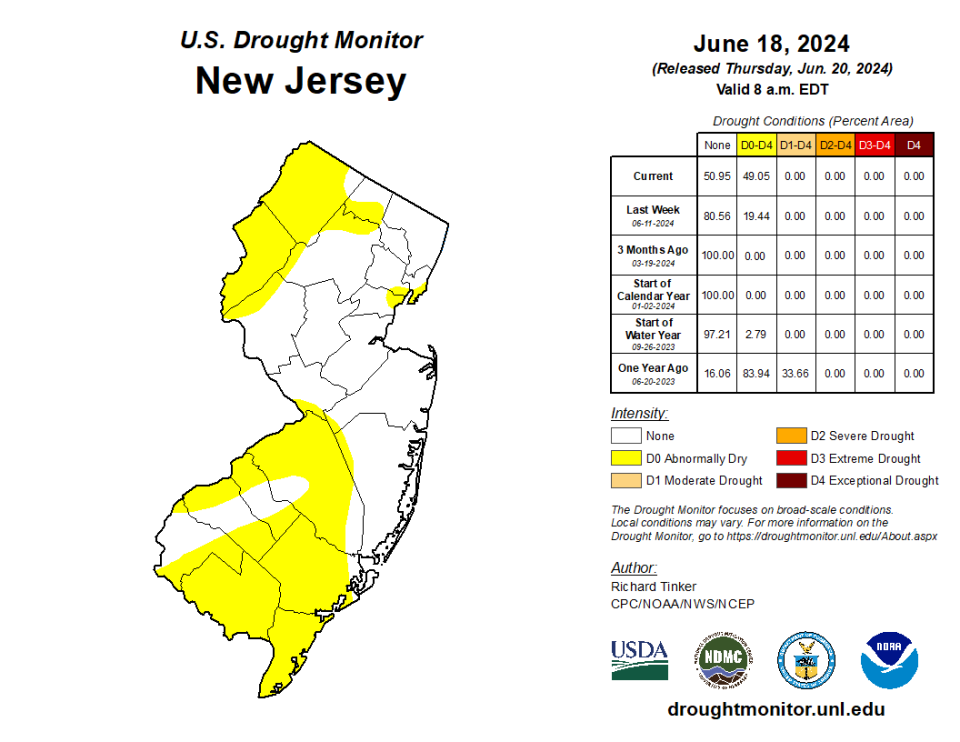Some North Jersey towns mandate, other urge residents to conserve water during heat wave
Several municipalities in North Jersey are urging residents to conserve water, with at least two mandating it, as the state continues to endure sweltering heat expected to last through the weekend, with only a slight chance of rain in the forecast.
The extreme temperatures coupled with a mere 0.3 inches of rain in the past week across the northern part of the state has created "abnormally dry" conditions in most of Sussex County and portions of Morris, Passaic, Essex and Hudson counties, and even a sliver of Bergen County, according to U.S. Drought Watch. The conditions, which indicate drought conditions could develop, show a marked change from last week, where no portion of North Jersey was considered abnormally dry.
While state officials have not mandated restrictions on water, many towns are taking it into their own hands to stave off the potential of critically low water tank levels, which could place local fire departments at risk.

Rich Calbi, the director of Ridgewood Water, which serves Glen Rock, Midland Park, Wyckoff and Ridgewood, urged residents to stop watering their lawns and to turn off sprinklers, stating that Stage III water restrictions "are imminent."
"Water storage tank levels are at a critically low level," Calbi wrote on the public utility company's website. If the levels drop even lower, it places the fire department at risk of not having the needed water supply for fire suppression and a boil water advisory may need to be issued, he said.
Water storage tank levels reached 54% on June 18, and should levels drop below 50%, it will trigger Stage III restrictions, according to an alert by Glen Rock officials. Under Stage III restrictions, residents using the Ridgewood Water system can only water plants via garden hose on designated days, with the cleaning of cars, houses or property or filling of pools prohibited.
Ridgewood Water already has Stage II permanent restrictions on watering properties during the summer months, much like several municipalities across North Jersey who have adopted policies via town hearings. In those areas, residents in odd- and even-numbered houses often alternate the days they can use sprinklers or in-ground irrigation systems to water properties, with towns limiting hours of watering for the mornings and evenings to eliminate evaporation. The use of hand-held hoses are typically permitted any time.
In Randolph, where restrictions on watering between May 1 and Sept. 30 were implemented back in 2007, residents who violate regulations are subjected to a summons and a first-offense penalty of $200.
Officials in Butler took it a step further and mandated residents stop watering their lawns and any other "unnecessary use of water," stating that water usage has spiked during the heat wave and restrictions had to be put in place to ensure ample water supply for use in homes and by firefighters. The Morris County borough also asked residents to stop washing cars and to shorten showers to reduce strain on the system, stating they will notify residents when normal water use can resume.
In a post to their website Thursday, Denville implemented mandatory water restrictions through the end of June due to an electrical issue with one of their wells, limiting the amount of water the township can use. Residents with even numbered homes can water plants, lawns, outdoor areas and vehicles on even numbered days, with odd numbered homes able to do so on odd numbered days.
How to conserve water
As heat index values swell near 100 on Saturday and Sunday, residents can do their part in helping conserve water, inside and outside their home.
Just a few simple steps can help reduce water use by as much as 30%, according to the state's New Jersey Department of Environmental Protection.
Richard Henning, president and chief executive officer of New Jersey Utilities Association, asked residents in the Garden State use water and energy efficiently, while also taking steps to stay comfortable and safe. Several steps can be taken to help save energy and lower stress on water delivery system, such as doing laundry later in the evening or setting your thermostat a couple of degrees higher, Henning said.
Here are more tips to help save water and conserve energy indoors:
Turn off the faucet while brushing teeth.
Take shorter showers or install lower flow showerheads.
Regularly check toilet, faucets, and pipes for leaks.
Run the washing machine and the dishwasher only with full loads. Consider drying clothes on an outdoor line.
Keep shades, blinds and curtains closed. Roughly 40% of heat comes in through windows.
Use fans strategically. Fans circulate air, creating a windchill effect, so position them to draw in cooler air or exhaust hot air.
Unplugging electronics and chargers when not in use. Even on standby mode, these devices continue to zap power.
Raise the thermostat a few degrees, or invest in a smart thermostat. The programmable devices allow you to adjust temperatures based on your daily routine and even weather conditions, optimizing energy usage.
Email: lcomstock@njherald.com; Twitter: @LoriComstockNJH or on Facebook.
This article originally appeared on New Jersey Herald: NJ towns ask residents to conserve water during heat wave

